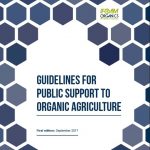
Title of document: Guidelines for Public Support to Organic Agriculture _ Version English & African Authors: IFOAM Journal’s name if any: Ministry/Government Agency/Organisation: IFOAM Year of publication: 2017 Geographic focus: Africa Main issues / topics addressed (for example: Context, scope and use of these guidelines; Why it makes political sense to support organic agriculture; History and overview of public support to organic agriculture globally; Determining the right mix of support measures: national/regional action plans and guidelines…) School of agroecology (if any): Web address to original document (if any): https://www.ifoam.bio/en/global-policy-toolkit-public-support-organic-agriculture Summary: the "Guidelines for public support to organic agriculture": these guidelines make the cornerstone of the toolkit and present the fullest possible compilation of facts, arguments and tips of the full panel of policy measures that can be conceived to support organic agriculture. Most of the sections of this main report are also broken down into separate documents, for easier download and use. The report is targeted to policy makers and policy advocates. IFOAM-Organics International also developed a special Sub-Saharan African version of the main report, which focuses on the information most relevant in the context of Sub-Sarahan African countries Read More
14 downloads
Author: ALiSEA teams
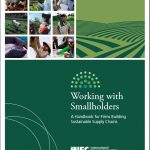
Title of document: Working with Smallholders: A Handbook for Firms Building Sustainable Supply Chains Authors: IFC Journal’s name if any: Ministry/Government Agency/Organisation: IFC Year of publication: 2013 Geographic focus: Global level Main issues / topics addressed (for example: Introduction; The Business Case for Working with Smallholder Farmers; An Evidence-Based Approach to Program Design; Aggregation Through Producer Organizations…) School of agroecology (if any): Web address to original document (if any): Summary: This handbook is a guide for firms who wish to expand their supply chains by working with smallholder farmers. The purpose is to enable more productive interactions between private firms and smallholders. This contribution is a part of our larger investment and advisory services in agribusiness that aim to shift our global food system to one where sustainable production is the norm and food and nutritional security is secured for this and for future generations. Read More
7 downloads
Author: ALiSEA teams
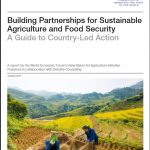
Title of document: Building Partnerships for Sustainable Agriculture and Food Security: A Guide to Country-Led Action Authors: NVA, Deloitte Consulting Journal’s name if any: Ministry/Government Agency/Organisation: NVA, Deloitte Consulting Year of publication: 2016 Geographic focus: Global level Main issues / topics addressed (for example: Introduction: A New Model for Action; The New Vision for Agriculture Experience: From Global Vision to Country-Led Action; The New Vision for Agriculture Country Partnership Model …) School of agroecology (if any): Web address to original document (if any): Summary: Over the past five years, the World Economic Forum’s New Vision for Agriculture (NVA) initiative has supported leaders in 19 countries across Asia, Africa and Latin America to develop action-oriented partnerships on the ground. These partnerships have mobilized over $10.5 billion in investment commitments, of which $1.9 billion has been implemented to date, benefiting 9.6 million farmers. The aim of this guide is to provide a dynamic resource that will empower and inspire the leaders who can build on and further develop these learnings to drive a transformation of the world’s agriculture and food systems. A report by the World Economic Forum’s New Vision for Agriculture initiative Prepared in collaboration with Deloitte Consulting, January 2016 Read More
8 downloads
Author: ALiSEA teams
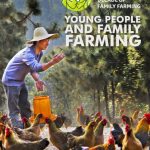
Title of document: Young people and Family farming Authors: WCC Journal’s name if any: Ministry/Government Agency/Organisation: WCC Year of publication: 2018 Geographic focus: General Main issues / topics addressed (for example: Introduction; Young People and Family Farming –Challenges; Family Farming and Youth: Potential; Reflexions From Practical Experiences…) School of agroecology (if any): Web address to original document (if any): http://www.familyfarmingcampaign.org/archivos/documentos/young_people_and_family_farming_en.pdf Summary: The main objective of this study is to describe the current situation and contribute to setting out a common position on youth development in family farming. The conclusions reached will therefore be taken into account in the policy lobbying on behalf of young people in the IYFF+10 campaign. Read More
10 downloads
Author: ALiSEA teams
Title of document: One Size Fits all or Tailor-Made? Building Appropriate Certification Systems for Geographical Indications in Southeast Asia Authors: Delphine Marie-Vivien and Isabelle Vagneron Journal’s name if any: Ministry/Government Agency/Organisation: WFP, AFD, CIRAD Year of publication: 2016 Geographic focus: South Earth Asia Main issues / topics addressed (for example: Introduction; A GI Control Model Advocated by the EU; Appropriate for the Control of GIs in Southeast Asia?; Discussion…) School of agroecology (if any): Web address to original document (if any): Summary: Geographical indications (GIs)—i.e. indications identifying goods originating in a specific place and having quality, characteristics, and reputation attributable to their geographical origin are developing fast in the Southeast Asian food sector, with a wide range of new products such as Khao Hom Mali and Thung Kula Rong-Hai (fragrant rice), Kampot pepper, or Nuoc Mam Phu Quoc (fish sauce). Read More
2 downloads
Author: ALiSEA teams
Title of document: G-STIC 2017 “Agroecology for Sustainable Food Systems” Authors: Lim Li Ching Journal’s name if any: Ministry/Government Agency/Organisation: G-STIC 2017 Year of publication: 2018 Geographic focus: Global level Main issues / topics addressed (for example: G-STIC 2017 - Agroecology summary “Agroecology for Sustainable Food Systems”…) School of agroecology (if any): Web address to original document (if any): Summary: This paper was prepared as a background document for the thematic session on ‘Agroecology for Sustainable Systems’ at the Global Science, Technology and Innovation Conference (G-STIC) 2017. G-STIC 2017 was held in Brussels from 23rd to 25th October 2017 Read More
4 downloads
Author: ALiSEA teams
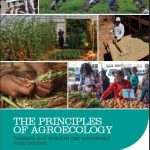
Title of document: The Principles of Agroecology: Towards Just, Resilient and Sustainable Food Systems Authors: CIDSE Journal’s name if any: Ministry/Government Agency/Organisation: CIDSE Year of publication: 2018 Geographic focus: Global level Main issues / topics addressed (for example: The environmental dimension of agroecology; The social and cultural dimension of agroecology; The economic dimension of agroecology; The political dimension of agroecology…) School of agroecology (if any): Web address to original document (if any): https://www.cidse.org/publications/just-food/food-and-climate/the-principles-of-agroecology.html Summary: This paper is an attempt to clarify what agroecology means, what it looks like and show that, when taken as a whole, agroecology and its various principles can lead to tremendous positive effects in terms of human rights and the right to food. An infographic completes this publication. It is published as part of a broader online multimedia dossier which includes related background documentation and video interviews. Our objective is to further develop a joint vision and understanding of agroecology. We will continue our dialogue with partner organisations and allies as well as with decision makers. The document is a living one which will be updated within the next 1.5 year Read More
7 downloads
Author: ALiSEA teams
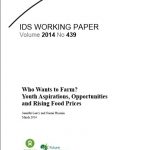
Title of document: Who Wants to Farm? Youth Aspirations, Opportunities and Rising Food Prices Authors: Jennifer Leavy and Naomi Hossain Journal’s name if any: Ministry/Government Agency/Organisation: OXFARM, DEV, IDS Year of publication: 2014 Geographic focus: Global Level Main issues / topics addressed (for example: Who wants to be a farmer? What the literature says; Approach and methodology; Findings; Conclusions…) School of agroecology (if any): Web address to original document (if any): Summary: This paper explores these conditions in a context of food price volatility, and in particular rising food prices since 2007. To do so, it analyses primary qualitative research on the attitudes of young people and their families to farming in 2012, a time when food prices had been high and volatile for half a decade. In theory, assuming higher prices benefit small farmers, food farming should be more attractive since food prices started to rise in 2007. But this simple causal assumption overlooks both that in many developing countries, it takes considerable economic power - ownership or access to cultivable land and affordable credit for inputs - to turn a profit in farming. It also fails to take into account more sociological explanations governing work and occupational choice - status aspiration and merit on the one hand, and perceived risk on the other. These two explanations help to explain why young people from relatively low income families, particularly those most likely to innovate and raise productivity levels, do not perceive farming as a realistically desirable occupational choice Read More
5 downloads
Author: ALiSEA teams
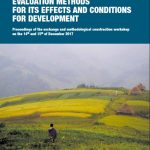
Title of document: The exchange and methodological construction workshop “Agro-Ecology: evaluation methods for its effects and conditions for development” _ Version English & French Authors: AGTAE, Agrisud, AVSF, CARI and GRET Journal’s name if any: Ministry/Government Agency/Organisation: AGTAE, Agrisud, AVSF, CARI and GRET Year of publication: 2017 Geographic focus: General Main issues / topics addressed (for example: Proceedings of the exchange and methodological construction workshop on the 14th and 15th of december 2017…) School of agroecology (if any): Web address to original document (if any): Summary: Proceedings of the exchange and methodological construction workshop “Agro-Ecology: evaluation methods for its effects and conditions for development” on the 14th and 15th of december 2017 Read More
4 downloads
Author: ALiSEA teams
Title of document: Annex of ADG's activity in Cambodia Authors: ADG Journal’s name if any: Ministry/Government Agency/Organisation: ADG Year of publication: Geographic focus: Cambodia Main issues / topics addressed (for example:…) School of agroecology (if any): Web address to original document (if any): Summary: 3 Annex of ADG's activity in Cambodia Read More
7 downloads
Author: ALiSEA teams

 Asia & Mekong Region
Asia & Mekong Region  Cambodia
Cambodia  Laos
Laos  Myanmar
Myanmar  Other
Other  Vietnam
Vietnam